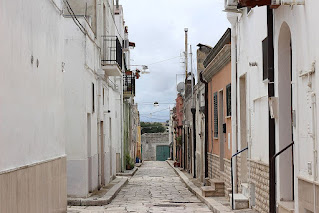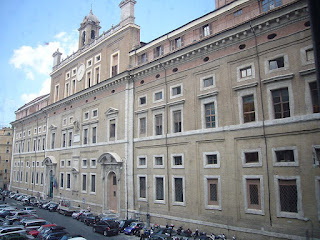NEW - Pope Innocent XII
Pontiff who banned nepotism in papal appointments
Pope Innocent XII, whose nine years as Pope at the end of the 17th century were notable for his ban on the practice of pontiffs appointing relatives to key positions in the papal court, was born Antonio Pignatelli on this day in 1615. Innocent XII, who was elected Pope in July 1691 and led the Catholic Church until his death in September 1700, issued the papal bull entitled Romanum decet pontificem within a year of taking office, abolishing the position of Cardinal-Nephew in the church hierarchy. The creation of Cardinal-Nephew as an office in the church had been officially recognised since 1566 but the practice of appointing family members had been used by a succession of popes since the Middle Ages to help them consolidate family power and wealth in an era when papal authority extended well beyond the confines of the church. The practice gave rise to the use of the term nepotism to describe the act of granting an advantage, privilege, or position to relatives or friends in any occupation or field. The word originates from cardinalis nepos, the Latin translation of ‘cardinal nephew’ - cardinale nipote in Italian. Read more…
______________________________________
Ligabue - record-breaking rock star
Musician and writer once dubbed 'Italy's Springsteen'
Rock musician Luciano Ligabue - known simply as Ligabue - was born on this day in 1960. Once dubbed ‘Italy’s Springsteen’, he has been hugely successful in his own country but has never managed to achieve true international recognition. Yet such is his popularity in Italy that a Ligabue concert held on a stage erected on Reggio Emilia's airfield in 2005 attracted an audience of 180,000, a European record for a paid-for event headlined by a single artist. He has played before audiences of more than 110,000 at the Giuseppe Meazza football stadium in Milan -- the home of Internazionale and AC Milan -- and has twice repeated the so-called Campovolo event in Reggio Emilia. In September 2015, a concert to celebrate Ligabue's 25 years in the music business sold 150,000 tickets, setting another record as the most lucrative single music concert in Italian history, with proceeds of around €7 million. Although he grew up with a love of music, it was some years before Ligabue was able to make a living from his passion. As a young man, he flitted from one job to another. Read more…
_______________________________________
Flavia Cacace - dancer
Star of Strictly Come Dancing famous for Argentine Tango
The dancer Flavia Cacace, who found fame through the British hit television show, Strictly Come Dancing, was born on this day in 1980 in Naples. She and professional partner Vincent Simone, who is from Puglia, performed on the show for seven seasons from 2006 to 2012. The show, which has been mimicked in more than 50 countries across the world, including Italy and the United States, pairs celebrities with professional dancers, combining Latin and ballroom dances in a competition lasting several months. Cacace, who was runner-up in 2007 with British actor Matt d'Angelo, left the show as champion in 2012 after she and the British Olympic gymnast Louis Smith won the final, which was watched by an estimated 13.35 million viewers. The youngest of six children, Cacace moved to England shortly before her fifth birthday when her father, Roberto, a chef, decided to look for work opportunities in London. Her family are from the Vomero district of Naples, a smart neighbourhood that occupies an elevated position on a hill overlooking the city, offering spectacular views. Read more…
_____________________________________
Eduardo Scarpetta - actor and playwright
Much-loved performer began theatrical dynasty
Eduardo Scarpetta, one of the most important writers and actors in Neapolitan theatre in the last 19th and early 20th centuries, was born on this day in 1853 in Naples. Fascinated by the commedia dell’arte and Neapolitan puppet theatre character Pulcinella, Scarpetta was the writer of more than 50 dialect plays in the comedy genre, creating his own character, Felice Sciosciammocca, a wide-eyed, gullible but essentially good-natured Neapolitan who featured prominently in his best-known work, Miseria e Nobiltà (Misery and Nobility). His plays made him wealthy, although his standing was damaged towards the end of his career by a notorious dispute with Gabriele D’Annunzio, the celebrated playwright and poet with aristocratic roots who was a considerable figure in Italian literature. A showman with a reputation for throwing extravagant parties, Scarpetta led a complicated personal life that saw him father at least eight children by at least four women, of which only one was by his wife, Rosa De Filippo. One of his relationships, with Rosa’s niece, Luisa, a theatre seamstress, produced three children - Eduardo, Peppino and Titina De Filippo - central figures in an Italian theatre and film dynasty in the 20th century. Read more…
_____________________________________
Bruno Conti - World Cup winner
Roma star was key figure for azzurri in 1982 victory
The former footballer - now coach - Bruno Conti, who played a starring role as Italy won the World Cup in Spain in 1982, was born on this day in 1955 in Nettuno, a seaside resort south of Rome. A winger with extravagant skills, Conti became an increasingly influential figure as the azzurri campaign in 1982 gathered momentum after a slow start. He scored Italy’s goal against Peru in the first group stage, a fine shot into the top right-hand corner from 20 yards (18m), although as a team Italy were not at their best and failed to win any of their opening three matches, scraping into the second group phase only by virtue of having scored more goals than Cameroon, who finished with the same number of points. But the second phase saw a transformation as Italy defied the odds to beat the holders Argentina and the multi-talented Brazil team of Socrates, Zico and Falcao who had started the tournament as hot favourites. Although the striker Paolo Rossi ultimately took the headlines with his hat-trick against Brazil, Conti played superbly in both matches, his runs and turns posing problems repeatedly for the opposition defence. Read more…
______________________________________
Corrado Gaipa – actor
From The Godfather to voice of Alec Guinness
The respected character actor and voice-dubber Corrado Gaipa was born on this day in 1925 in Palermo. His versatility as a voice actor brought him considerable work at a time when Italian cinema audiences much preferred to watch dubbed versions of mainstream English-language films rather than hear the original soundtrack with subtitles. Gaipa’s voice replaced that of Alec Guinness as Obi-Wan Kenobi in the original Star Wars trilogy. He was also heard dubbing Spencer Tracy in Guess Who’s Coming to Dinner, Burt Lancaster in The Leopard, Telly Savalas in The Dirty Dozen and Lee J Cobb in The Exorcist. He was the voice of a number of characters in animation films also, including Bagheera in Walt Disney’s The Jungle Book and Scat-Cat in The Aristocats. As an actor in his own right, he worked with many leading directors in Italian cinema, including Francesco Rosi and Vittorio Gassman. His most famous role was probably that of Don Tommasino in Francis Ford Coppola’s The Godfather. In Mario Puzo’s story, Don Tommasino was an old friend in Sicily of the movie’s main character, Vito Corleone. Read more…
______________________________________
Book of the Day: Dark History of the Popes, by Brenda Ralph Lewis
In the 10th century, being head of the Catholic Church didn’t stop Pope John XII from allegedly committing incest with his sisters, calling on pagan gods and goddesses, being an alcoholic and putting his mistress in charge of his brothel. Of course, being Pope didn’t make popes popular either: in 896AD, Pope Formosus died, but that was no obstacle to Lambert of Spoleto, who bore something of a grudge, in exhuming the pontiff and putting him on trial. Formosus was found guilty of being unworthy of his papal office, had all his acts annulled and his body was thrown in the Tiber. From corruption to nepotism, from crusade to witch-burning to Inquisition, from popes sanctioning murder to popes being murdered, Dark History of The Popes explores more than 1000 years of sinister deeds surrounding the papacy. Ranging from the 9th century AD to Pope Pius XII’s position during World War II, the book examines political, religious and social history through the skulduggery of popes and courtiers, the role the Borgias family played in the papacy, the persecution of Jews and the religious controversy over Galileo Galilei’s heretical views, among other topics. Using diaries, letters, reports from foreign ambassadors to the Vatican and official registers of the ecclesiastical courts, a picture of both sinning and sinned against popes is revealed. Packed with more than 200 colour and black-&-white photographs, paintings and artworks, Dark History of The Popes is an eye-opening account of the history of the papacy that pontiffs would rather not mention.Brenda Ralph Lewis is a prolific writer with over 70 books to her name. In 1997-1998, she wrote a complete part-work celebrating the life of Diana, Princess of Wales. Formerly royal correspondent for four British newspapers, she has contributed regular articles for Royalty magazine and appeared in TV documentaries about the monarchy.
Booking.com

.jpg)

.jpg)








.jpg)







